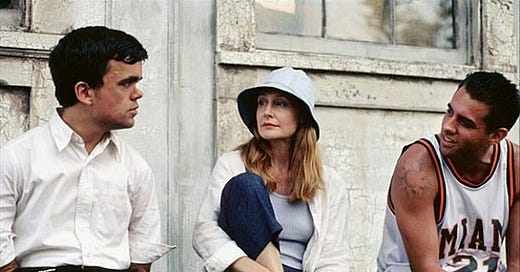The Station Agent

Jim Jarmusch’s “Paterson” and Terrence Malick’s “Song to Song” are recent examples of the small genre of so-called “plotless” films. “Paterson” feels as if we’ve just dropped in on the lives of a relatively boring young married couple. And “Song to Song” feels like we just dropped in on a music festival. In both cases, many audience members left the theatre thinking, “So what?”
Let me recommend a quiet, deliberately paced “plotless” film that energizes its viewers with a shot of life – yet does so subtly enough we may not notice for several days. The picture I have in mind is Tom McCarthy’s 2003 festival-circuit favorite “The Station Agent” – the film that made Peter Dinklage a star. Released a dozen years before McCarthy’s Oscar-winning “Spotlight,” “The Station Agent” follows an anti-social dwarf whose only real interest is classic trains.
Fin McBride (Dinklage, in his breakout role) works in a model train shop in New Jersey. When the store’s owner dies unexpectedly, his will mandates the closing of the store while bequeathing a swath of rural property to Fin. On this property sits an abandoned train depot. Fin moves in, and shuts down – in a literal sense. He keeps to himself in the small, darkened dwelling – only venturing into town for groceries and other necessities.
Into this mundane existence come two townsfolk. Olivia (Patricia Clarkson from “The Green Mile”) is a struggling artist who lost her son several years earlier. The loss has caused Olivia and her husband to separate. Joe (Bobby Cannavale) mans a food stand with seemingly no customer traffic. How these three manage to find one another is a tribute to the slight genius of McCarthy’s original screenplay. Suffice to say there are no plot contrivances as there might be in a Hollywood production. These three primary characters possess no mutual interests nor do they have anything in common – save for the innate desire to connect with others. Fin doesn’t think he needs this attachment, but McCarthy seems to be intent on proving him wrong.
As “The Station Agent” progresses – with more character development than actual storyline – Fin begins to feel a sense of belonging that was sorely missing in his previous existence. Several other characters are introduced, including Olivia’s estranged husband, David (John Slattery), and a young Michelle Williams as a librarian drawn to Fin as a potential romantic interest.
Notice how I’m telling you about the characters as opposed to the plot? It’s not that nothing happens in “The Station Agent.” It’s just that what happens isn’t part of an overarching story. When Joe drives Fin and his movie camera alongside a passing train, we share in Fin’s joy as he films the stately behemoth. When Emily’s contemptible boyfriend pushes Fin aside at the local watering hole, we share in his discontent. The “action” of “The Station Agent” takes place in everyday vignettes. There’s no bank robbery, no criminals, no superheroes. Heck, there’s not even a gun or an explosion.
In fact, “The Station Agent” is so devoid of conventional motion picture protocol that its silence is practically a character in its own right. I remember writing that Hawaii was practically a character in Alexander Payne’s “The Descendants.” By the same token, taciturnity is, in a way, a character in “The Station Agent.” McCarthy embraces the reticence of everyday life the way Stanley Kubrick embraced the reticence of outer space in “2001: A Space Odyssey.”
To say I loved “The Station Agent” would be an understatement. I know this picture won’t be everyone’s cup of tea. Don’t watch it when you’re tired. Watch it when you’re ready for something so unique it almost eclipses classification. Watch for anything that happens between passages of dialogue. This is one in which as much is said without colloquy than with it. And that’s why it’s this month’s Buried Treasure.
Andy Ray's reviews of current films appear on http://www.artschannelindy.com/



